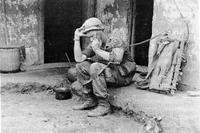Toby Hauck, an Air Force veteran and air traffic controller in Chicago, said he received a paycheck from the government Thursday -- minus the money.
"We're getting to see pay stubs with nothing but zeros on them," said Hauck, one of several hundred air traffic controllers in the Chicago area working without pay during the partial shutdown, now in its 20th day, that has affected nine federal departments and several smaller agencies.
Hauck, one of thousands of veterans feeling the shutdown's impact, said the Leave and Earnings Statement sent to his bank had "all zeros" under the heading "Net Pay."
"It's a tough time out here right now, a lot of uncertainty on what to do next," he said of the back-and-forth between Congress and the White House on resolving the impasse, which centers on the $5.7 billion President Donald Trump has demanded for the southern border wall.
Ed Canales, a 100 percent-disabled veteran and Bureau of Prisons worker in California, said, "It's getting to crunch time" for the estimated 800,000 federal workers who have either been furloughed or are working without pay.
Canales, a former Army specialist and Desert Storm veteran, said, "We've got a lot of young kids coming back from Iraq and Syria" who now have federal jobs. "They have low pay as it is, and now they're being denied a check."
"You can get into a deep depression" over the situation, he added.
"God forbid, I start getting the phone calls I dread," said Canales, a union representative who echoed the fears of other federal union officials that veterans under financial stress would harm themselves.
"Right now, our veterans are standing on a cliff," said Will Attig, a former Army sergeant and Iraq veteran.
"One of the leading causes of veterans suicide is financial insecurity," said Attig, executive director of the Union Veterans Council of the AFL-CIO.
About 31 percent of the federal workforce is made up of veterans, and the federal government is the nation's largest employer of disabled veterans, he said. "It's a shame that they're being allowed to be used as pawns in a political game."
Younger veterans just off active duty "are working paycheck to paycheck" in federal jobs, Attig said. "Some average about $500 a week, but they have good benefits and a stable job. Then this happens. They didn't realize they'd be fighting another battle when they came home."
A move in Congress Thursday to end the stalemate shutdown failed, and Trump visited the Texas-Mexico border region the same day to underscore his case that the U.S. faces an immigration crisis that a border wall could alleviate.
The president has said he would consider declaring a national emergency, which would allow him to use funds allocated by Congress to the Defense Department for the border wall. But in his address to the nation Tuesday night, he stopped short of declaring such an emergency.
In Congress, the Senate mulled House proposals to reopen parts of the government while pushing consideration of border wall funding to a later date, but Senate Majority Leader Mitch McConnell, R-Kentucky, blocked a vote.
"Political stunts are not going to get us anywhere," McConnell said on the Senate floor. He added that he would not allow a vote on any legislation that Trump will not sign.
-- Richard Sisk can be reached at Richard.Sisk@Military.com.















